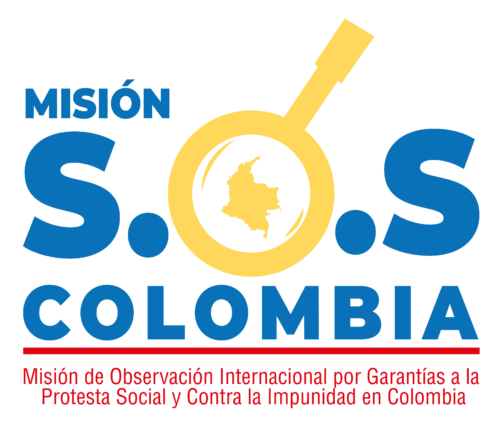
For Immediate Release.
July 2nd, 2021 – An international mission made up of forty human rights experts and leaders from eleven countries (Argentina, Mexico, Canada, the United States, Chile, Ecuador, Guatemala, Spain, Germany and Belgium) will travel to Colombia from July 3rd to July 12th to receive first-hand testimonies from the victims of violence, abuses and police repression in Colombia’s protests. The mission aims to identify the contexts in which these events have occurred, as well as verify and monitor the impacts and status of investigations into 7,704 aggressions documented by human rights and social organizations over the past fifty-five days of social mobilization.
The international observation mission seeks to identify extrajudicial and judicial mechanisms that have led to legal and social impunity before and after actions of repression by the Colombia government during the protests, and investigate how and why law enforcement agents are evading accountability for their actions during the national strike.
This visit has been organized by social organizations and human rights organizations in Colombia as a result of the grave human rights violations committed by security forces against peaceful demonstrators following the State’s decision to violently repress protests.
The international observation mission is also part of an international call for solidarity considering the lack of guarantees for the free exercise of the right to protest and the violent repression by the State. The militarized response to the protests in Colombia, provided for by Decree 575, issued on 28 May, is in breach of Colombia’s international human rights obligations. Actions of repression and containment carried out by the police force, its special force ESMAD (mobile riot police units) and the military, have led to the militarization of demonstration sites in cities and the paramilitarization of police operations. President Duque and other high-ranking officials have also continued to promote hate speech and stigmatization against protestors, and announced new reforms to further limit protests, such as Decree 003, which sanctions the obstruction of public roads.
The international observation mission will visit key locations of resistance; meet with government and police entities in Antioquia, Bogotá and Cundinamarca, Valle, Nariño, Atlántico, Bolívar, Cauca, Risaralda, Quindío, Caldas and Santander; and dialogue with national authorities about the institutional response to date.
Following its visit, the mission will present a report with conclusions and recommendations on the guarantee of the right to protest and against impunity in Colombia, as well as create a permanent monitoring mechanism. The international observation mission’s report will serve as critical input for advocacy actions before the governments of the countries that are members of the mission and who are in favor of guarantees for the right to protest and against impunity in the context of Colombia’s national strike.
The international observation mission has been organized by the following Committee: Campaña Defender la Libertad un Asunto de Todas; Centro de Investigación y Educación Popular, CINEP; Comisión Intereclesial de Justicia y Paz; Fundación Comité de Solidaridad con presos Políticos, CSPP; Fundación Forjando Futuros; instituto de Estudios para el Desarrollo y la Paz, INDEPAZ; Corporación Jurídica Libertad, CJL; Plataformas de DDHH: Alianza de organizaciones Sociales y Afines; Coordinación Colombia Europa Estados Unidos, CCEEU; Plataforma Colombiana de Derechos Humanos, Democracia y Desarrollo, PCDHD.
Photo: Colombia’s Mobile Anti-Disturbances Squadron (ESMAD) opens fire on protestors at close range. Photo Courtesy Regional Indigenous Council of Cauca (CRIC)




